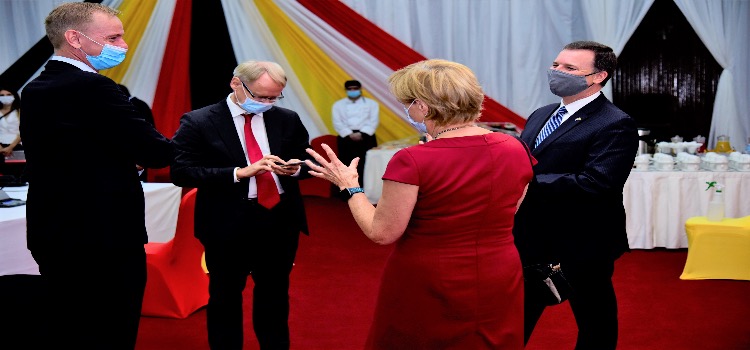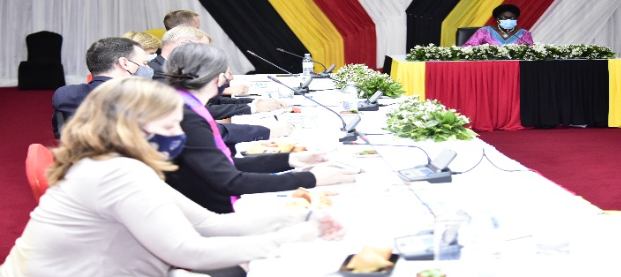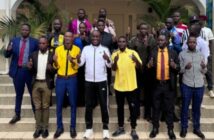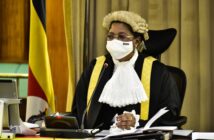Foreign envoys accredited to Uganda have expressed concern about the violence exhibited during party primaries, limited participation of women and the perception that Covid-19 Standard Operating Procedures are being fronted to restrict human rights in the current electoral period.
The envoys from the European Union Delegation, Austria, US, Sweden, Denmark, Norway, Belgium and Germany who separately or jointly fund different aspects of democracy and good governance in Uganda, met the Speaker of Parliament, Rebecca Kadaga, as part of their ongoing interactions with key political actors and institutions ahead of next year’s general elections.
The meeting was held at Parliament Building today, Friday 02 October 2020.
Parliamentary Commissioners, Hon. Safia Nalule and Hon. Francis Mwijukye, Committee Chairpersons, Hon. Hood Katuramu (Foreign Affairs) and Hon. Jacob Oboth (Legal and Parliamentary Affairs), and the Deputy Clerk (Parliamentary Affairs) Paul Wabwire also attended the meeting.

The ambassadors interact before the start of the meeting
The Danish Ambassador, HE Petersen Nicolaj said that the Electoral Commission, during their meeting, had expressed frustration with all political parties as none of them were respecting Covid-19 SOPs during their activities.
He however said that there was a perception that the SOPs are only being enforced when it comes to some political parties but not all.
“What can be done to mitigate violence during the electoral process? It would be good to hear what you would recommend to political parties to avoid violence during period,” he said adding that ,“It would be good to hear your view on how Parliament can play a part in ensuring a level playing field and that all SOPs are for everyone.”
H.E Per Lindgarde (Sweden) said that women are facing many challenges including harassment, cyber bullying and intimidation during the electoral proces, and wondered what can be done to get increased number of women candidates and elected not only on the women seats but also in general.
Dr. Roswitha Kremser (Austria), noted that the violence in the elections would negatively affect women participation in the exercise, which would be detrimental to their representation in national leadership.
The envoys called for mass sensitization of Ugandans on the electoral process, especially in observing SOPs to curb the spread of Covid-19.
Speaker Kadaga said that it was the responsibility of candidates to restrain their supporters from being violent against their opponents. She said elections naturally cause a lot of excitement and that the process of lining up behind aspirants to select flag bearers was being used for the first time leading to challenges.
“I am aware that people flouted some Covid-19 guidelines and held rallies, it was a difficult situation. We wanted to ensure that we carry out our mandate of electing people but also ensure safety,” she said.
She called on Civil Society Organizations (CSOs) monitoring elections, to spread their activities across the country rather than concentrate in cities or town areas.
She said access to print media where most of the programmes by CSOs were highlighted, were not affordable for persons in rural areas.
“The people who really need the message are in the village, who do not have access to television, radios or newspapers. Tell the people you are funding that they should get out of the city and go where the real people are,” said Kadaga.
On the issue of the National Local Content Bill 2020 that was passed by Parliament in May 2020, but returned to the House for reconsideration by President Museveni, H.E Per Lindgarde, said Swedish investors expressed concern about the new legislation noting that it would result in an export-credit facility only financing part of the contract value.
H.E Elin Østebø Johansen (Norway) proposed that it was prudent to work carefully on the Bill to see where the balance lay for Uganda as regards the world and the African free trade area.
Kadaga told the envoys that the purpose of the Bill was to level the playing field and allow Ugandans to benefit more from contracts offered by government.
“If we have a contract in this country, why should we allow 90 per cent of the money to go out? This is matter of grave concern and we think we have a right to participate because these are not gifts, but they are loans,” Kadaga said.



